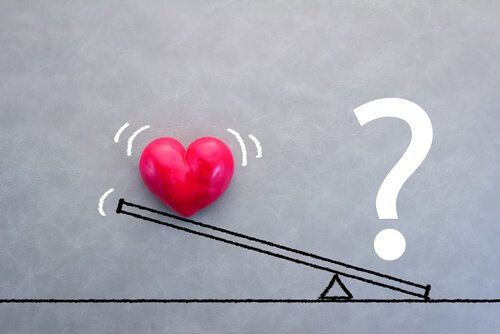3 Signs of Insecurity in Love

Falling in love with someone means taking a leap of faith and sharing our most intimate things. That’s why some people experience insecurity in love. Because loving is trusting, letting yourself go, and opening up to another person.
Your relationship should be a safe zone where you’re able to express yourself and also be yourself. If this isn’t the case, you might end up full of insecurities and doubt. In this article, we talk about the signs of insecurity in love that people in a relationship may experience.
If you meet somebody and you like them a lot, but then you feel insecure or fearful that they may hurt you and give up before even establishing a bond, then you might also be insecure in love. In other words, ‘running away’ from someone you just met is a clear sign of insecurity. However, there are other signs of insecurity in love that may go unnoticed.
The first sign of insecurity in love: Control and jealousy
A sign that you’re insecure in love is trying to control everything, either the relationship itself (the things the couple does together) or your partner (what they do or don’t do). Some people feel an impulsive need to take control in order not to feel threatened.
When someone wants to control their partner, it’s generally because they feel insecure. A need for control could also mean that there are deeper psychological problems, such as obsessive-compulsive disorder.

Moreover, insecurity in love also manifests itself in the form of jealousy. Jealousy is the ‘default’ sign of insecurity. People who trust their partner and have self-confidence may also feel jealous from time to time, but certainly less frequently and not as strongly.
A good way to avoid jealousy is stopping all behaviors that result from it. For example, asking your significant other where they are, at what time they’ll get to a place, constantly checking their social media, etc.
Constantly wanting signs of affection
Being too aware of the things your lover does to show you their affection is a sign of insecurity. Everyone likes to feel special and loved, but obsessively counting the times your partner does something sweet isn’t normal. There are people who measure and compare the things their partner does to show them love and even ask them to say ‘I love you’ or quantify their love.
Likewise, those who are insecure in love may say things like “You don’t love me like you love your friends” or “When we’re alone you don’t show your affection, but you do show it in front of everyone else”. These are all signs of fear, insecurity, and low self-esteem. However, making these kinds of comments is completely normal if you don’t do it all the time or they don’t create tension.
A study carried out by Dr. Megan McCarthy at the University of Waterloo claims that people with low self-esteem tend to keep their ‘needs’ to themselves so that they don’t bother their partner. This leads to difficulties in forming a healthy bond. Accusations, criticisms, and a feeling of uneasiness will eventually arise.

Not speaking your mind and avoiding conflict
Arguing and disagreeing with your partner is actually healthy. In fact, disagreements and differences are necessary in order to understand that their needs are different from yours.
Many people try to avoid any hint of an argument, believing that this is a symptom of weakness. As a result, they don’t speak their mind and try to only encourage conversations that agree with what their partner is saying.
This habit, which could benefit communication in the short-term, ends up harming the couple in the long-run. A lack of spontaneity, far from eliminating insecurity in love, will actually make it worse.
The good thing is that these three signs we talked about aren’t only useful to detect insecurity in love. Being aware of them and trying to change them can even help eliminate this insecurity. In the end, being in a relationship is a good way of having support, especially if you can be yourself around your partner. But it can also create tension when there isn’t enough trust.
All cited sources were thoroughly reviewed by our team to ensure their quality, reliability, currency, and validity. The bibliography of this article was considered reliable and of academic or scientific accuracy.
- Stackert, R. A., & Bursik, K. (2003). Why am I unsatisfied? Adult attachment style, gendered irrational relationship beliefs, and young adult romantic relationship satisfaction. Personality and Individual Differences. https://doi.org/10.1016/S0191-8869(02)00124-1
- Kurdek, L. A. (2002). On being insecure about the assessment of attachment styles. Journal of Social and Personal Relationships. https://doi.org/10.1177/0265407502196005
- Domingue, R., & Mollen, D. (2009). Attachment and conflict communication in adult romantic relationships. Journal of Social and Personal Relationships. https://doi.org/10.1177/0265407509347932
This text is provided for informational purposes only and does not replace consultation with a professional. If in doubt, consult your specialist.








